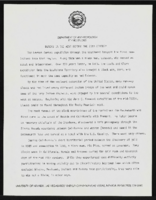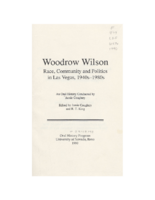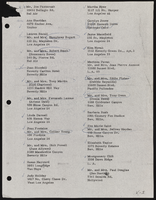Search the Special Collections and Archives Portal
Search Results

Transcript of interview with Hugh E. Key by Bob Bush, February 21, 1980
Date
Archival Collection
Description
On February 21, 1980, collector Bob Bush interviewed porter and retired military man, Hugh E. Key (born on November 17th, 1919 in Fordyce, Arkansas) in Las Vegas, Nevada. This interview covers the life of a Las Vegas old-timer. Hugh Keys’ wife, Mrs. Key, is also present during the interview and offers a few remarks.
Text
Anna Corine Tisdale oral history interview
Identifier
Abstract
Oral history interview with Anna Corine Tisdale conducted by Claytee D. White on May 28, 1996 for the African Americans in Las Vegas: a Collaborative Oral History Project. In this interview, Tisdale, a native of Fordyce, Arkansas, talks about her background as the daughter of sharecroppers, her marriage, and her move to Las Vegas, Nevada in 1954. She recalls living in a small trailer with her husband and four children for several months before the family moved to "Four Mile" near the Boulder Highway. She details her working life, starting as a retail clerk and then moving into hotel housekeeping, eventually earning promotion as the first Black supervisor-inspector at the Sahara Hotel and Casino. She also offers comparisons of her life in Fordyce and Las Vegas, about recreational activities, education, race issues, and how men and women worked in the same environment in the 1960s. The audio also includes a brief conversation with her oldest daughter, Nancy.
Archival Collection
Jimmy Gay oral history interview: audio clip
Date
Archival Collection
Description
Jimmy Gay discusses racism in Las Vegas before and after World War II. He says that prior to WWII, there wasn't a lot of prejudice, and there were only a few African American families. After WWII, he says that the influx of soldiers returning and the migration of Black families from the South led to Las Vegas becoming the "Mississippi of the West."
Sound
Coleen York Wilson oral history interview
Identifier
Abstract
Oral history interview with Coleen York Wilson conducted by Claytee D. White on June 4, 1996 for the African Americans in Las Vegas: a Collaborative Oral History Project. In this interview, Wilson talks about growing up in Fordyce, Arkansas before moving to Las Vegas, Nevada in 1953 at the age of eighteen. She mentions that her parents had moved to Nevada in 1940 to work at Basic Magnesium, Incorporated (BMI), living in a trailer before returning to Fordyce two years later. She then discusses moving to Las Vegas to join an older sister and relates that she did not remember any discrimination in seating or eating meals during her bus trip. After this, Wilson lists the jobs she held in Las Vegas before her retirement in 1984, including work at the Las Vegas Cleaners, serving as a school crossing guard, and working as a housekeeping supervisor at the Stardust Resort Hotel, the Hacienda Resort Hotel, and Circus Circus Hotel and Casino before taking a job at the Nevada Test Site. She also talks about her family, her church activities, and her regret at not attending college.
Archival Collection

"Blacks in the West Before the 20th Century": unpublished manuscript by Roosevelt Fitzgerald
Date
Archival Collection
Description
From the Roosevelt Fitzgerald Professional Papers (MS-01082) -- Unpublished manuscripts file.
Text

Transcript of an Interview with Sonny Thomas by Barbara Tabach on February 28, 2013
Date
Archival Collection
Description
Sonny (Sandy C.) Thomas is from Fordyce AR. He worked in hotels for over 30 years before securing job as funeral director for which he was trained.
Text

Transcript of interview with Woodrow Wilson by Jamie Coughtry, 1989
Date
Description
Interview with Woodrow Wilson conducted by Jamie Coughtry in 1989. Born in a Mississippi sawmill town in 1915 to a family that ran a boarding house, Wilson completed high school at a private boarding school and attended two years of junior college before the declining economy forced him into the Civilian Conservation Corps to work as a cook and baker. Migrating west in 1940, Wilson soon settled in Las Vegas, Nevada, where he worked for Basic Magnesium, Inc. He became a prominent Westside community activist, founding a federal credit union and serving as president of the Las Vegas NAACP. Wilson worked for over thirty years as a warehouseman for companies that occupied the Basic Magnesium site. In 1966, he was elected to the state assembly, becoming the first black legislator in the history of Nevada, advocating open housing legislation, anti-discrimination regulations, welfare reform, and civil rights.
Text
Maria Benítez oral history interview
Identifier
Abstract
Oral history interview with Maria Benítez conducted by Monserrath Hernández and Maribel Estrada Calderón on June 21, 2019 for the Latinx Voices of Southern Nevada Oral History Project. Maria Benítez is the image of a hardworking and determined Salvadoran woman. After facing adversity amidst the Salvadorian Civil War she talks about her journey as a nurse in El Salvador and migrating to the United States. Here in Las Vegas, she has worked as a cook on the Strip, been an active member of her church, and supported the education of her children selling pupusas. Subjects discussed include: El Salvador, Salvadorian Civil War, Migration, US Citizenship Documentation, and Judaism.
Archival Collection

